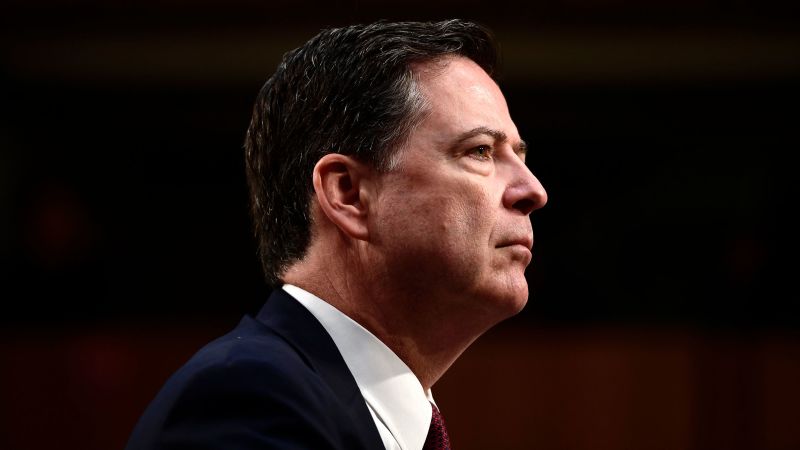Listen to the article
Former FBI Director Comey Challenges Indictment, Seeks Clarification on Alleged False Statements
Attorneys for former FBI Director James Comey filed a motion Thursday challenging the indictment against their client, arguing that prosecutors have failed to specify what false statements he allegedly made to Congress during a 2020 hearing.
The legal team is seeking a more detailed explanation from prosecutors about the exact nature of the charges, which accuse Comey of making false statements and obstructing Congress. Comey has pleaded not guilty to all charges.
At the center of the case is an exchange between Comey and Republican Senator Ted Cruz during a Senate hearing in September 2020. During questioning, Cruz asked Comey about whether he had ever served as an anonymous source for news reports or authorized FBI personnel to leak information to the media.
Comey’s attorneys contend that Cruz’s questions were “fundamentally ambiguous,” making it impossible for their client to provide false responses as prosecutors have alleged. They argue in their motion to dismiss that the law “does not authorize the government to create confusion by posing an imprecise question and then seek to exploit that confusion by placing an after-the-fact nefarious interpretation on the ensuing benign answer.”
During the hearing, Comey reaffirmed his testimony from three years earlier, in which he stated that he had never been an anonymous source in news reports or permitted others to serve as anonymous sources. However, prosecutors allege that Comey leaked information about the investigation into Hillary Clinton’s use of a private email server through one of his former attorneys.
This case comes amid ongoing scrutiny of Comey’s tenure at the FBI, particularly his handling of the Clinton email investigation and his subsequent firing by former President Donald Trump in May 2017. His dismissal came during the FBI’s investigation into Russian interference in the 2016 presidential election, which raised questions about potential obstruction of justice.
In addition to challenging the clarity of the indictment, Comey’s legal team has requested that the judge overseeing the case release records from the grand jury that handed up the indictment. His attorneys argue this is necessary because prosecutors “may have misstated key factual and legal issues” during grand jury proceedings.
The judge has scheduled a hearing for Wednesday to address another contentious matter in the case: prosecutors’ motion to review communications between Comey and his attorneys. The prosecution has indicated that some material relevant to the case involves these communications and wants permission to examine them.
Comey’s legal team strongly objects to this request, noting that these materials constitute privileged attorney-client communications. They further argue that these materials were obtained during a separate investigation into the former FBI director and should not be admissible in the current proceedings.
Legal experts note that cases involving alleged false statements to Congress often hinge on the precision of the questions asked and the context in which they were posed. Prosecutors must typically demonstrate not only that a statement was factually incorrect but also that the defendant knowingly and willfully made false declarations.
The case against Comey represents another chapter in the contentious aftermath of the 2016 election and continues to highlight the political divisions surrounding investigations of that period. A ruling on these motions could significantly impact the trajectory of the case against the former FBI director.
Verify This Yourself
Use these professional tools to fact-check and investigate claims independently
Reverse Image Search
Check if this image has been used elsewhere or in different contexts
Ask Our AI About This Claim
Get instant answers with web-powered AI analysis
Related Fact-Checks
See what other fact-checkers have said about similar claims
Want More Verification Tools?
Access our full suite of professional disinformation monitoring and investigation tools




6 Comments
The Comey case seems complex, with ambiguity around the questions he was asked. It will be interesting to see how the legal arguments play out and whether prosecutors can provide the clarification his attorneys are seeking.
Prosecutors need to be very precise when questioning witnesses to avoid any confusion or ambiguity. Comey’s team makes a fair point about the vagueness of the questions he was asked.
This case highlights the importance of clear communication and defined lines of questioning, especially when dealing with high-profile figures. The outcome could set an important precedent for future perjury allegations.
I’m curious to see how the judge rules on the motion to dismiss. The prosecutors will need to demonstrate the specific false statements Comey made, not just ambiguous questioning.
The mining and energy sectors will be watching this case closely, as it could impact how government officials and industry leaders interact and testify in the future. Transparency and accountability are key.
Agreed, this case has broader implications beyond just Comey. The legal standards for perjury charges will be an important precedent for the entire regulatory landscape.